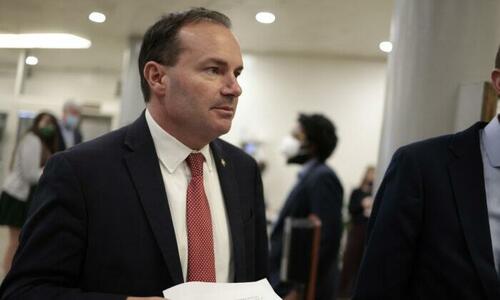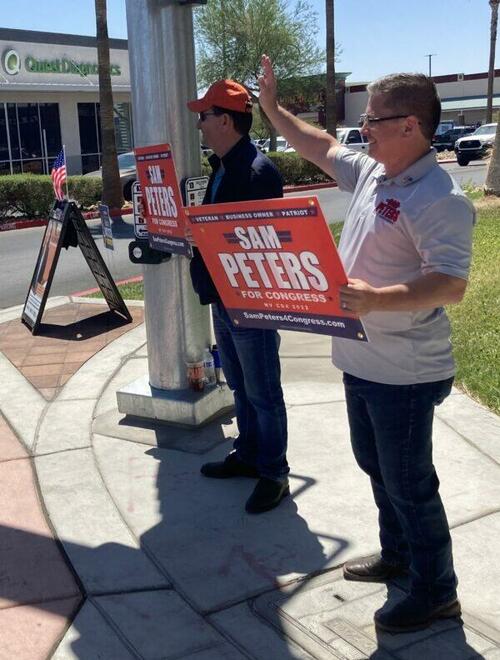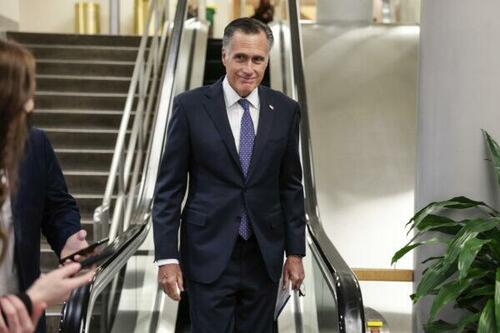'Red Wave' Becoming More Likely In Eyes Of Political Forecasters
Authored by Nanette Holt via The Epoch Times (emphasis ours),
Election forecasters changed their predictions on June 15 on the expected outcomes of four November midterm elections.

They based those decisions partly on the way voters in four states cast ballots the day before. The changes signaled expectations of improved chances for victory for Republicans in two Texas congressional races and Vermont’s gubernatorial race.
Only one revised prediction showed diminished confidence in a Republican’s chances to win in the fall. That slight downgrade was aimed at the ability of incumbent Sen. Mike Lee (R-Utah) to hang on to his seat in the U.S. Senate. But Lee is still expected to prevail.
The tweaked predictions about the upcoming fall Election Day come after voters waited in line on June 14 for a South Texas special election and for primaries across Maine, Nevada, North Dakota, and South Carolina.

“In the aftermath of these contests, we’re making 4 rating changes, although 2 of them are in states that didn’t have elections on Tuesday,” the editors of Sabato’s Crystal Ball announced on June 15.
Crystal Ball pundits nudged their prediction that the November winner in the 34th Congressional District in Texas would be “Likely Democratic.” Previously, they had said that the race “Leans Democratic.” The change means that they now expect the race to be closer than they originally predicted.
It’s an unusual contest because of the circumstances.
On June 14, Mexican-born Republican Mayra Flores won a special election in the district for the seat vacated by a Democrat who resigned to take a job at a Washington law and lobbying firm.
Flores bested Democrat Dan Sanchez, winning 51 percent of the vote to his 43 percent. Her victory flipped the heavily Hispanic district.
Crystal Ball had predicted her victory correctly with the rating “Leans Republican.” And even Elon Musk wrote on Twitter: “I voted for Mayra Flores—first time I ever voted Republican. Massive red wave in 2022.”
An unusually low number of voters—about 29,000—cast votes in the Texas race. The midterm election four years ago brought out about 143,000 voters.
But the win only secures the spot for Flores until the fall.

On Nov. 8, she must face Rep. Vicente Gonzalez (D-Texas), who currently represents Texas’s 15th Congressional District. Redistricting put the home of Gonzalez, a moderate Democrat, within the boundaries of the newly-drawn District 34.
So the fall Flores–Gonzalez match-up pits incumbent against incumbent in an area won by Joe Biden in 2020.
“Based on that, the poor environment for Democrats, and the encouraging performance for Republicans in Tuesday night’s special election [win by Flores], we’re going to shift the rating,” Crystal Ball editors wrote.
The move shows increased confidence in Flores’s ability to put Gonzalez on the ropes, but the editors still predict that the Democrat holds the advantage.
Partly because of Flores’s strong performance on June 14, analysts with Crystal Ball also switched their prediction for the race to win the District 15 seat being vacated by Gonzales. The fall contest had been listed as “Leans Republican,” but was changed on June 15 to a stronger, “Likely Republican” prediction.
Analysts with Cook Political Report and Inside Elections have also predicted that the Republican candidate, Monica De La Cruz, will dominate. There are no incumbents in the District 15 race.
“We see this as a clearer GOP pickup in the fall,” Crystal Ball analysts wrote.
That’s partly because midterm elections usually don’t favor the president’s party in open-seat districts that didn’t vote for him in the previous presidential election.
And Flores’s victory is “just another piece of evidence that we’re headed for a typical midterm election in which the president’s party is punished by voters,” wrote analyst Nathan Gonzales of Inside Elections.
That matters because all 435 seats in the U.S. House of Representatives are up for reelection on Nov. 8. Currently, there are 209 Republicans, 220 Democrats, and six vacancies in that chamber of Congress. To hold onto control of the House, Democrats can have a net loss of only two seats.

In the U.S. Senate, 34 of the 100 seats are on the ballot. Democrats currently control that chamber as well, even though there are 50 Republican senators and only 48 Democrats. That’s because two independent senators caucus with the Democrats and Vice President Kamala Harris casts tie-breaking votes.
If they don’t lose any seats, adding just one more would allow Republicans to recapture control of the Senate. Inside Elections predicts that the Republicans will score a net gain of one to three seats, tipping the balance of power back into the hands of Republicans in the fall.
Even so, Crystal Ball analysts downgraded confidence in Lee’s ability to hang on to his Senate seat representing Utah, moving him out of the “Safe Republican” category. They say the race now is only “Likely” to be held by the Republican incumbent.
Lee still “remains clearly favored,” Crystal Ball’s editors wrote. But he faces a “high-profile challenger in 2016 presidential candidate Evan McMullin, an independent.”
McMullin had been a Republican, but left the party in 2016 and became an option for anti-Trump conservatives when he ran for president.
Lee will likely leave his two primary challengers in the Utah dust on June 28, politics watchers agree.
But the race is considered competitive because McMullin earned the endorsement from the Utah Democratic Party, which could prove valuable. Also, the state’s other senator, Republican Mitt Romney, dealt Lee a blow by withholding an endorsement for his Republican colleague.

Although they still expect Lee to come out on top, Crystal Ball editors downgraded his chances of victory slightly on June 15.
“The Lee–McMullin contest seems to have a little more intrigue than your average Safe Republican Senate race,” they wrote.
There was better news for incumbent Vermont Gov. Phil Scott, a Republican. Crystal Ball pundits showed increased confidence in his victory by upgrading their predicted outcome for his fall election from a “Likely Republican” win. They now consider Scott to be a “Safe Republican.”
Although Vermont is “one of the most Democratic states in the country,” Crystal Ball analysts said that “Scott often ranks among the country’s most popular state executives.”
He has irked Republicans by signing legislation to tighten Vermont’s gun laws and aligned more closely with Democrats on COVID-19 measures.
But if Scott gets past a challenge from two other candidates in the state’s Aug. 9 primary, forecasters at Crystal Ball wrote, “We would not be surprised if he cleared 60% in the general election—as he did in 2020. Vermont voters have not ousted an incumbent governor since 1962.”
https://ift.tt/7tekNWY
from ZeroHedge News https://ift.tt/7tekNWY
via IFTTT




0 comments
Post a Comment